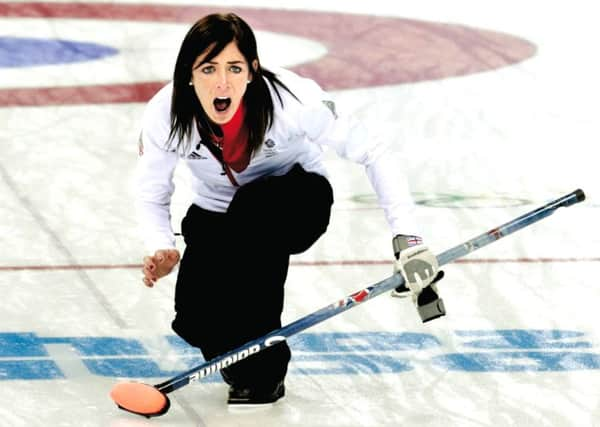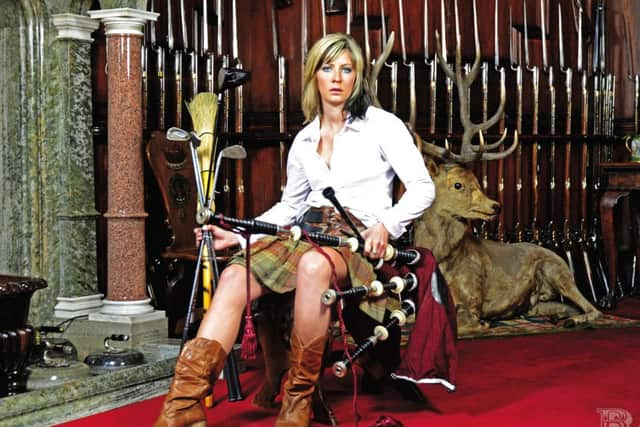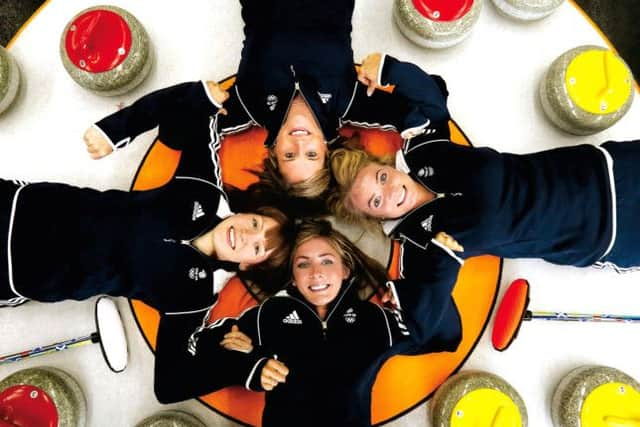Eve Muirhead looks to brush aside curling rivals


Two weeks ago Eve Muirhead, skip of Scotland’s curling team and poster girl for Team GB at the Winter Olympics, was at home in Stirling, in domestic mode. She announced via Twitter: “Time to put the Marigolds on and get the Hoover out! #scrubtheflat #nofun”.
Today Muirhead is in Sochi and banned from social media, all the better to concentrate on bringing home a medal on Thursday. As she is in many ways a normal 23-year-old, with fluctuating coloured hair, a tattoo (the Olympic rings on her lower back, done before Vancouver in 2010) and a serious mobile addiction, this is tough.
Advertisement
Hide AdAdvertisement
Hide Ad“I just don’t quite know what to do when I pick up my phone,” she said last week. “I have no Twitter or Facebook to click on.” It was, she added, probably best not to follow too closely what was being said back home.


Yesterday home fans celebrated as Muirhead and her colleagues notched up another victory at Sochi, against South Korea, steadying nerves after a shaky start last week when the women lost to Sweden and Canada.
There is still all to play for, with the Olympic gold-medal decider just days away, in what is anticipated to be one of Team GB’s Sochi highlights.
Twenty years ago, when curling was still known as “housework on ice”, played (according to legend) with a hollow brush filled with whisky, a Twitter blackout would not have been an issue, even if such a thing had existed back then. Nobody would have been saying anything. Curling was not an Olympic sport. It was concentrated in the pockets of Scotland where there were decent curling rinks: Lockerbie; Perth; Renfrew. Scots played on a world stage, but few people outside the sport’s clannish community noticed.
The Olympics changed all that. Curling was played at the first winter games, in Chamonix, France, in 1924, and popped up as an exhibition sport a couple of times before it was played for medals in 1998 in Calgary, Canada.


Four years later, when Rhona Howie (then known as Rhona Martin) skippered the UK team in Salt Lake City to Olympic gold, it became clear that curling was that rare beast: a sport at which Scots could excel.
Eve Muirhead, aged 12, was up way past her bedtime to watch that US final (along with six million others). Seeing Howie play that final stone – dubbed “the stone of destiny” – was a pivotal moment.
“I had school the next day but I was allowed to stay up,” she recalled. “It was a great inspiration for the sport and for me. Rhona winning the gold showed what can be done and it’s something I’ve dreamt of ever since.”
Advertisement
Hide AdAdvertisement
Hide AdGrowing up on a farm in Blair Atholl, Perthshire, young Eve was surrounded by the sport. A world-class piper, she played the medal-winners onto the podium at the Scottish championships. Her father, Thomas, was often one of them – he was also a world and European gold medalist. Her brothers Glen and Thomas also play. Thomas is competing at the Scottish Championships in Perth at the moment, torn between putting in his best performance on the ice and watching his big sis do her stuff for Team GB.
While Muirhead excelled as a junior – she’s the only person in the world to win four junior world titles – curling was not her only sport. A scratch golfer, she turned down golf scholarships to the US to pursue a career on the ice. This was a pragmatic decision, to be a big star in a Cinderella sport rather than a wannabe in an overcrowded one.
“I knew that I had a great opportunity with curling,” she said recently. “With golf, it’s tough to make it to the top. I knew from a young age that I had good opportunities to do well in curling.”
This choice has worked out well for Muirhead, and for the sport. She got to be skip of the national team before she was 20 and is a full-time athlete with a manager and personal sponsorship deals with Samsung and Scottish Equity Partners. Scottish curling gets a fresh face, someone who can walk the catwalk in a tartan frock for Dressed to Kilt in New York and pose in nothing but a Saltire, who talks a great game but stands for no nonsense. Added bonus: at tournaments and competitions, she can double up as the piper. Plus Team GB gets a poster girl with electric-blue eyes who not only looks great in Lycra but has a very good chance of securing a gold medal.
The timing is perfect for Muirhead because curling is at the heart of the Sochi games. In previous Winter Olympics, the rink has been on a separate site. Rhona Martin threw the stone of destiny 60 miles away from the main arena. This year the curlers are competing in the middle of the park, in the centre of the action. Russian President Vladimir Putin has been in the audience and many other spectators have stumbled on a game and stayed to see what’s going on.
According to Mike Haggerty, who has followed the sport for many years, this is good and bad. Many of these accidental supporters know nothing about the game. This goes for journalists as well. “I’ve had people arrive and ask me where the goalposts are.”
The Russian team brings an exuberant contingent with them. “Whenever they are playing the crowd in the curling hall goes crazy,” says Haggerty. And with up to four games going on at any one time during the round-robin stages, that is a lot of noise. “They know nothing about curling but they’re learning. Whenever the Russians take a good shot, the roof comes off.”
Other members of Team GB have been in to watch and cheer Muirhead and her crew. This works both ways – on Friday, after mashing Japan 12-3 – they had a team debrief before heading off to watch what they call “the boys” beat Denmark 8-6.
Advertisement
Hide AdAdvertisement
Hide AdRhona Howie, now head coach of the ladies’ team, is in Sochi with them, loving being part of the Olympics again “We’re all together. It’s great fun,” she says.
Having supervised the team’s development and training over the past three years, her role is now to keep everything steady and calm. “We have the same routine as we always do, we leave our accommodation at a set time, we do the same warm-up, the team talk. My job is to ensure that everyone’s OK, and to be here when they need me,” she adds.
Muirhead’s team are in their early 20s, whereas Howie was 36, married with two children, when she won gold in Utah. But mothering Muirhead and the others is not in her remit.
“They are very mature and good at looking after themselves. They have done all their laundry, they eat at the right time. There has been no nagging from me,” she says.
Competing at the start of the millennium, Howie and her team followed a generic curling training programme. They were part-time athletes until the six months before the games. Muirhead and her team-mates have moved to Stirling to be beside the training rink. They follow individual programmes. Their schedule, which includes video analysis and gym work, focuses on what Howie calls “the three Ts: technical; tactical; and team dynamic”.
“It’s a skill-based sport. We spend more time on the ice, more time throwing stones and that has paid off.”
She is not wrong. A curling rink is 45-metres long. The curlers have to deliver their stones, around guards and through gaps, to within a centimetre of the desired spot on the most slippery surface found in nature. The skip has to think three or four moves in advance – not for nothing is curling known as “chess on ice”. The game lasts for around three hours, with the last stone thrown by the skip. Mike Haggerty explains: “She has got to get the last stone in the right place. There is no-one better in the world than Eve Muirhead at doing that.” Howie agrees. “She thrives on pressure. She loves the pressure of playing that last stone.”
Muirhead’s chutzpah does not always pay off. Last week, closing the game against Canada, she could have played safe and gone for a draw. She chose to throw for glory; it didn’t work. Howie, herself a risk-taker, had no problem with that. “It was the right call.”
Advertisement
Hide AdAdvertisement
Hide AdIt’s years of exposure to the sport, says the coach, that makes Muirhead such a force in the game. “She has watched from such an early age – years of watching, practice and feedback. And she always wants to learn. She is developing all the time.”
It has been noted. Even the Canadians – the world’s leading curling nation, with a professional league – are wondering what is giving the Scots their edge. “We’ve got so many good teams chasing at our tails, wondering what we’re doing, how we’re training,” Muirhead said before the games. “Now the Canadians are asking us what we’re doing in the gym and how many hours a week we practise, trying to figure out what we do.”
It’s fitting the country where curling was invented – we have been shunting rocks over frozen lochs since medieval times when it was known as “the roaring game” because of the noise of rock skiting over ice – should excel at the game.
The facilities are in place: English curling teams come to Scottish rinks to play their championship matches. And there is another generation of strong players snapping at Team Muirhead’s heels: today the Scottish championships will be decided in Perth. The timing was decided years in advance, to allow the Olympians to concentrate on preparing for Sochi and leave the way clear for others to taste high-level competition.
The game’s governing body, the Royal Caledonian Curling Club, is poised to take advantage of the Olympic effect, with taster sessions for the sport running at ice rinks across the country. It even has a Facebook page, a development that would have been unthinkable five years ago.
Back in the day, Howie and her team were described as “housewives on ice”. After the initial hooha died down they failed to capitalise on their Olympic triumph. It’s hard to imagine Muirhead et al making the same mistakes. The coach has not broached the subject of what happens next with the team – “I haven’t thought that far ahead, that’s a conversation for afterwards” – but Muirhead’s managers are already marshalling her offers and planning her next moves.
For all of Scotland, and the rest of the UK, the champagne is on ice.
Twitter: @MsA Burnside